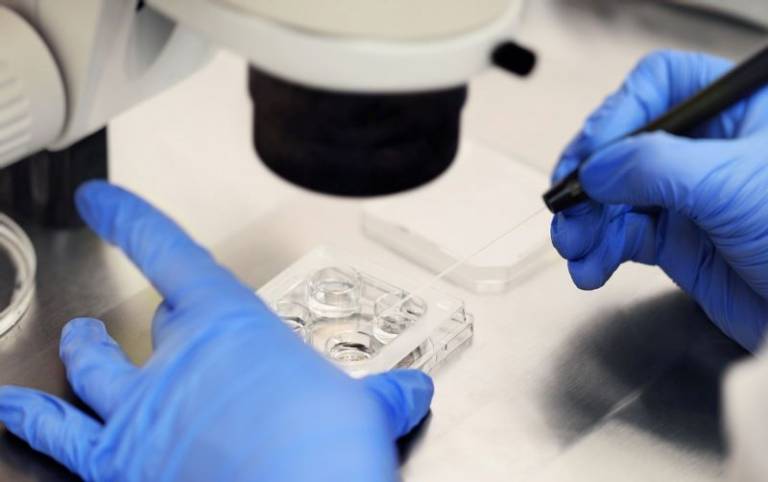One in five women become pregnant naturally after having a baby conceived with IVF
21 June 2023
Around 20% of women who needed fertility treatment, such as IVF, to conceive their first child are likely to get pregnant naturally in the future, finds a new UCL study.

The first-of-its-kind research, published in Human Reproduction, analysed data from 11 studies of over 5,000 women around the world between 1980 and 2021, to evaluate how common it is to get pregnant naturally after having a baby conceived by fertility treatment.
They found that at least one in five women conceived naturally after having had a baby using fertility treatment such as IVF, mostly within three years. This figure remained unchanged, even when taking into account the different types and outcome of fertility treatment – alongside length of follow up.
Infertility is defined by the failure to achieve a pregnancy after 12 months or more of regular unprotected sexual intercourse, and it is estimated to affect one in seven heterosexual couples.
However, not all women seeking and undergoing fertility treatment are absolutely or permanently infertile. And half of couples who struggle to conceive naturally in the first year of trying will go on to do so in the second year.
Although it is typically considered ‘rare’ for a woman to get pregnant naturally, if she has previously had fertility treatment, the researchers want to highlight how it is not in fact an unusual event.
The team consider the findings to be particularly important, as many women may not realise that they could conceive naturally following fertility treatment.
This could lead to them becoming pregnant again quickly or when they aren’t ready – which could be problematic for both the health of the mother and child.
Lead author, Dr Annette Thwaites (UCL EGA Institute for Women’s Health) said: “Our findings suggest that natural pregnancy after having a baby by IVF is far from rare. This is in contrast with widely held views – by women and health professionals – and those commonly expressed in the media, that it is a highly unlikely event.”
Much has changed since the early days of IVF and it is now used for a wide range of causes of infertility, including cases where no cause is ever found.
In addition, some women may not have experienced infertility at all but used treatment for other reasons. This could include single women using donor sperm, women in same sex relationships, surrogates or those seeking to screen for serious genetic conditions.
So, it is important for those who have had successful IVF to know how likely they are to conceive naturally afterwards.
IVF was first used in 1978 and now, more than 10 million babies worldwide have been born using the treatment – equating to between 1% and 6% of all babies born per year in the developed world by 2020.
In order to track the data more accurately and analyse which factors make natural pregnancy after having a baby by fertility treatment more likely, the researchers are calling for linked national data sets.
They hope that this information could then be used to counsel people considering their options after successful fertility treatment.
Dr Thwaites said: “Knowing what is possible would empower women to plan their families and make informed choices regarding further fertility treatment and/or contraception.”
Study limitations
The included studies were mostly of moderate quality and varied widely by geography, cause of subfertility, type and outcome of fertility treatment and length of follow up making direct comparisons difficult.
Patient stories
Shema:
Shema Tariq, a doctor and academic from London, was diagnosed with low ovarian reserve and told that her chances of conceiving without IVF were almost zero. She has two children aged three and four.
She says: "It took six rounds of IVF to conceive our son, who was born in 2018. My GP briefly mentioned contraception to me after he was born, but we both laughed and agreed that it wasn't relevant. It never occurred to me that I might get pregnant (despite being a sexual health doctor). I was 43 and had been told that my chances of conceiving naturally were less than 1%.
“Eight months later I was unexpectedly, and naturally, pregnant with our daughter. She has been the most wonderful surprise, but when we first found out I felt overwhelmed and unprepared for another pregnancy. If I'd known that one-in-five women conceive naturally after IVF I'd have used contraception until I was ready both emotionally and physically."
Sally:
After being diagnosed with endometriosis in her 20s, Sally Pearse was told by healthcare specialists that it was almost impossible that she’d ever conceive naturally.
She said: “Before having my first child I was told by a gynaecologist after a laparoscopy that my only way to conceive was through IVF due to endometriosis. After the birth of my first child though IVF I met with the IVF consultant and asked if I may conceive naturally now I had had a successful pregnancy. I was told I had a 1% chance of conceiving naturally so started plans for IVF again.
“The next month I conceived naturally and went on to have my second child.
“I was not given a reason for the 1% chance and feel that even experts in their role get these things wrong. If I hadn't wanted another child I would have been shocked rather than pleasantly surprised.”
Links
- Research in Human Reproduction
- Dr Annette Thwaite's academic profile
- UCL EGA Institute for Women's Health
- UCL Population Health Sciences
Image
- Kalinovskiy on iStock
Media contact
Poppy Danby
E: p.danby [at] ucl.ac.uk
 Close
Close

